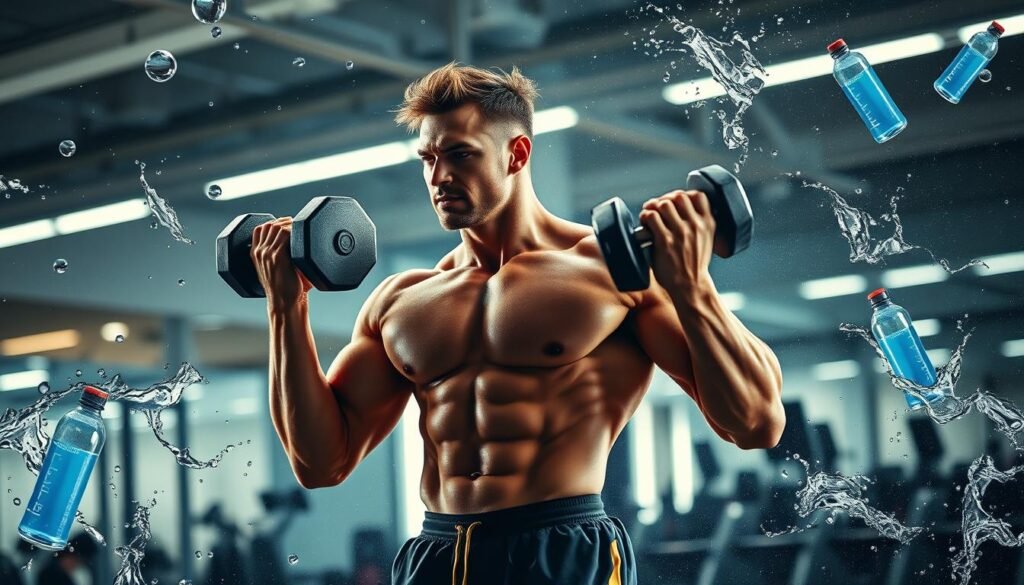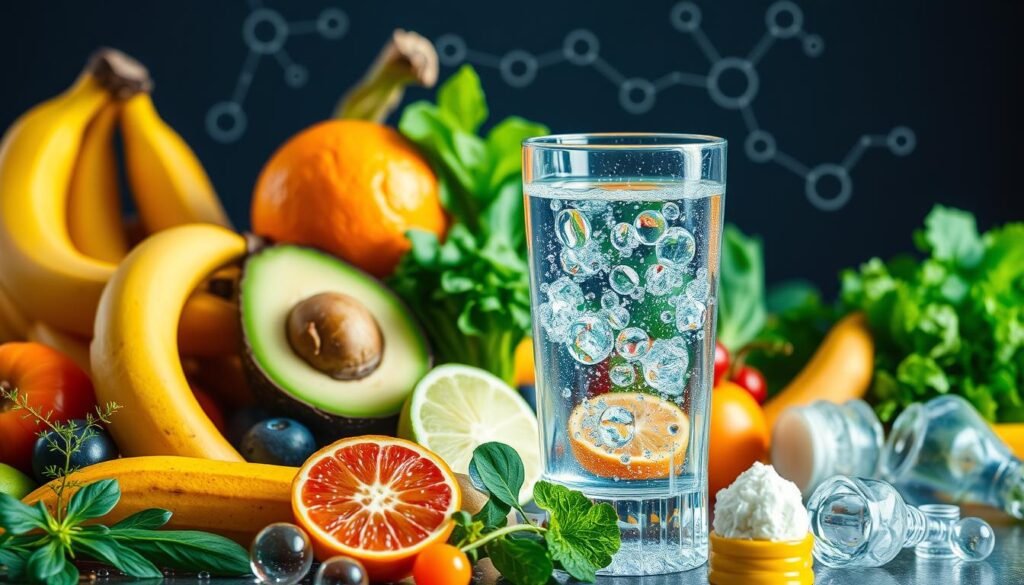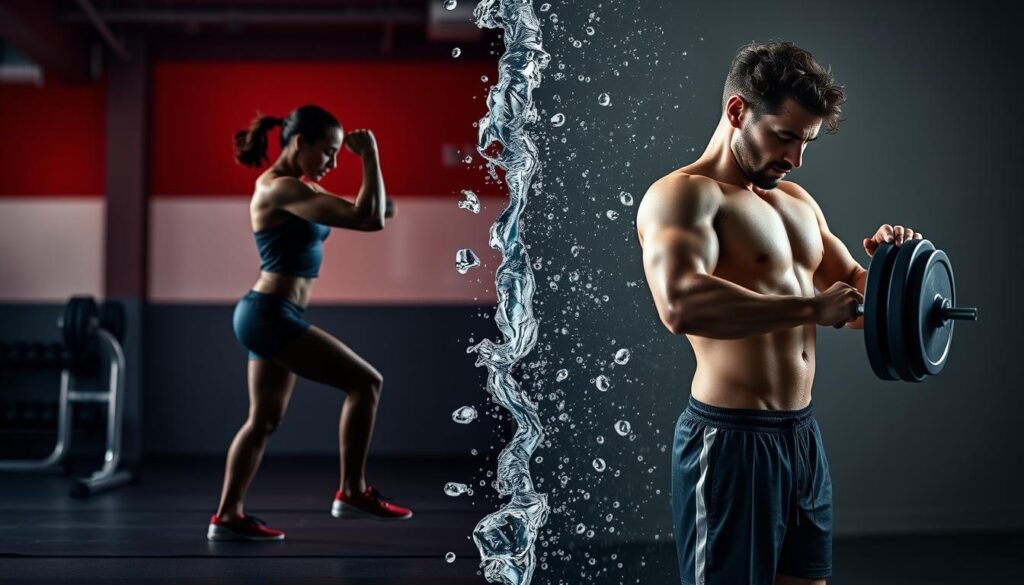Did you know about 75% of people in the U.S. are often dehydrated? This fact is important because it affects not just our daily activities but also our muscle growth and workout quality. For bodybuilders, understanding the negative effects of dehydration is key. Staying hydrated is crucial for their success in fitness.
Not drinking enough water can make you tired, grumpy, and slow down muscle recovery. When you don’t drink enough, your body can’t work well. This can harm your health and fitness progress. In this article, we’ll explore how dehydration affects fitness. We’ll also share tips on how to stay hydrated. Dehydration shouldn’t stop your muscle-building efforts!
Key Takeaways
- 75% of Americans are chronically dehydrated.
- Dehydration can lead to fatigue and decreased workout performance.
- Bodybuilders must prioritize hydration to optimize muscle growth.
- Incorporating high-water content foods can aid in hydration.
- Consistent water intake is crucial for overall health and fitness progress.
Understanding Dehydration and Its Impact on Fitness
Dehydration is often not given enough attention by fitness lovers. Yet, it seriously harms health and fitness performance. It happens when you lose more fluids than you drink. This can cause many problems, especially when you’re working out hard. Folks might feel tired, dizzy, and get muscle cramps. It’s key for bodybuilders to grasp how staying hydrated affects their training.
In the world of bodybuilding, staying hydrated is key. It helps move nutrients and heals muscles. Being well-hydrated helps you train harder and recover quicker, which is crucial for muscle growth. If you lose more than two percent of your body weight from not drinking enough before or during exercise, you’re facing exercise-induced dehydration.
Chronic dehydration builds up over time and really knocks down performance. It’s often because people don’t drink enough water each day. If you’re pregnant or breastfeeding, the risk is even higher. To avoid the dangers of long-term dehydration, it’s important to drink 13-20 ounces of fluid every couple of hours. Also, make sure to hydrate well before exercising.
To learn more about hydration status and how dehydration impacts fitness, click here.
How Dehydration Can Derail Your Bulk
During a bulking phase, eating more and staying hydrated are key. Nutrition and hydration are very important for muscle growth. Not drinking enough water can really hurt your efforts. About 75% of Americans don’t drink enough water. This is a big problem for bodybuilders.
Not getting enough water can make you tired. This means you might workout less and not as well. If muscles don’t get enough water, they don’t recover or grow properly. It’s important to see how not having enough water can mess up your muscle-building plans.
Eating foods high in water can also help with hydration. For example, 20% of our water intake comes from food. Foods like tomatoes are great because 95% of a tomato’s weight is water. Adding these kinds of foods to your diet can help keep your water levels up. This helps you do better in workouts.
To stay hydrated, try making smoothies with coconut water, pineapple, and strawberries. These ingredients hydrate you and give you nutrients for muscle recovery. Foods like quinoa, rice, and oatmeal are good too. They absorb water when cooked.
Be careful with foods that can dehydrate you. This means foods that have a lot of salt or sodium. Try to eat less than 500 milligrams of sodium a day. And go for a diet that helps you stay hydrated. For tips on meal planning that focuses on hydration, visit this guide.
Common Dehydration Symptoms to Watch For
Identifying dehydration symptoms is crucial for good health and fitness. Thirst is often the first sign, pointing out the need for hydration awareness. Some common symptoms are:
- Dry mouth
- Fatigue
- Dizziness
- Headaches
- Decreased urine output
- Dark urine
- Muscle cramps
Research found that 91% of surgical trainees felt dehydration symptoms, like headaches and fatigue, during long procedures. This shows the importance of staying hydrated, especially during intense activities. Studies also show these symptoms may impair thinking and mood, which affects performance.
It appears women often feel dehydration symptoms more than men, finding it harder to rehydrate. Athletes, such as tennis players, need to watch out for cramps, dizziness, and unusual tiredness. This is because of high sweat rates and heat.
Quickly addressing symptoms of dehydration helps prevent worse issues, like kidney stones or heat-related illnesses. It’s key to adopt hydration practices early to protect fitness and health.
| Dehydration Symptoms | Impact on Performance |
|---|---|
| Thirst | Decreased cognitive function |
| Fatigue | Lower physical performance |
| Dizziness | Increased risk of injury |
| Dry mouth | Difficulty consuming fluids |
| Headaches | Impaired focus and concentration |
The Importance of Hydration for Muscle Growth
Staying hydrated is key to muscle growth and bodybuilding. With enough water, your muscles work better and your workout performance improves. This is because water helps move important nutrients into muscles, helping them repair and grow.
Drinking enough water is crucial for avoiding mistakes that limit muscle growth. Not enough water can make you weaker and less enduring during workouts. It shows why drinking water regularly is as important as eating right for muscle growth.
Knowing how hydration helps muscle growth teaches us to keep our fluid levels up every day. It helps our muscles function and recover after exercising. Plus, it cuts the risk of getting tired and hurt, letting us push our limits safely.

For bodybuilders, watching your water intake is as vital as tracking your food. Putting focus on both can boost muscle growth and recovery. This leads to better results in fitness.
Effective Hydration Strategies for Bodybuilders
For bodybuilders, staying hydrated is crucial for top performance and fast recovery. Good hydration methods can also improve workout results and overall health. It’s useful to eat foods with a lot of water. Smoothies are a great way to stay hydrated and get nutrition too.
Eat Foods with High Water Content
Adding foods that contain a lot of water to your diet is smart. Fruits and veggies offer both moisture and important nutrients. Some top choices include:
- Watermelon
- Cucumbers
- Strawberries
- Bell peppers
- Spinach
These foods help you stay hydrated and make your meals more interesting. By eating these foods, bodybuilders can better meet their daily water needs.
Hydrating Smoothies and Meal Prep
Using hydrating smoothies daily can greatly improve how much water you get. You can make these smoothies taste different every time by using a variety of ingredients. A good smoothie might include:
- Coconut water
- Avocados
- Spinach or kale
- Frozen fruits like berries or bananas
By preparing these smoothies ahead of time, bodybuilders always have healthy choices. These drinks not only keep you hydrated but also give you vitamins and minerals you need for training.
| Food | Water Content (%) | Nutrients Provided |
|---|---|---|
| Watermelon | 92% | Vitamins A, C, and potassium |
| Cucumbers | 95% | Vitamins K, C, and magnesium |
| Strawberries | 91% | Vitamins C, manganese, and folate |
| Bell Peppers | 92% | Vitamins A, C, and B6 |
| Spinach | 91% | Vitamins A, C, K, and iron |
Understanding Electrolyte Balance in Hydration
Keeping the right electrolyte balance is key for staying hydrated, especially during hard workouts. Electrolytes like sodium, potassium, and magnesium are important for muscle work and keeping body fluids balanced. If they’re not balanced, you might get muscle cramps, feel tired, or have stomach pain.
Staying hydrated helps with muscle recovery. It’s often suggested to drink at least eight cups of water daily. Other than water, eating fruits like cucumbers, watermelon, and oranges can help you stay hydrated. Plus, drinks full of electrolytes bring back important minerals after exercise.
People who work out a lot should watch out for diuretics like caffeine and alcohol. These can reduce your body’s water and make dehydration worse. It’s critical to keep up with your hydration, especially when it’s hot or during intense exercise, to avoid problems from dehydration.
To emphasize how important electrolyte balance is, here’s a table showing key electrolytes, their roles, and where to find them:
| Electrolyte | Function | Food Sources |
|---|---|---|
| Sodium | Regulates fluid balance and blood pressure | Salt, pickles, olives |
| Potassium | Supports muscle contractions and nerve signaling | Bananas, oranges, leafy greens |
| Magnesium | Facilitates energy production and supports muscle function | Nuts, seeds, beans, whole grains |
Knowing about electrolyte balance can help you improve hydration techniques. This supports better muscle recovery and overall performance. For more tips on setting goals for bulking and nutrition, visit this resource.

Water Intake Guidelines for Optimal Performance
Keeping the right hydration level is key for top performance, especially for bodybuilders. Following water intake guidelines can boost your daily water consumption. This leads to better hydration during exercises. Knowing these guidelines allows people to customize their hydration plans based on their needs.
Daily Water Intake Based on Weight
To figure out how much water you need every day, consider your weight. The rule of thumb is to drink 0.5 to 1 ounce of water for each pound you weigh. For instance:
| Body Weight (lbs) | Recommended Daily Water Intake (oz) |
|---|---|
| 150 | 75 – 150 |
| 175 | 88 – 175 |
| 200 | 100 – 200 |
| 225 | 112 – 225 |
| 250 | 125 – 250 |
This table gives a clear guide for figuring out your daily water needs. A good hydration strategy supports muscle work, aids in recovery, and improves health.
Adjusting Water Intake During Workouts
During physical activities, especially hard workouts, bodybuilders need to drink more water. Losing water through sweat can cause dehydration. That’s why it’s critical to drink enough before, during, and after exercise. Here are some tips:
- Drink at least 16-24 ounces of water 2 hours before exercising.
- During workouts, aim to consume 7-10 ounces of fluids every 10-20 minutes.
- Post-exercise, hydrate with additional fluids to replace any lost through sweat.
Sticking to these hydration hints helps avoid dehydration and keeps performance high. Proper water intake ensures that training is as effective as it can be.
How Dehydration Affects Workout Performance
Dehydration greatly impacts workout performance. Losing just two percent of your body weight can cause trouble. It leads to less strength and poor focus. If you lose this much fluid, it’s harder to manage tiredness during workouts.
Acute dehydration happens fast, especially when you don’t drink enough before or during exercise. It brings on thirst, dizziness, and cramps. These problems can make workouts feel harder and last shorter. By making sure to drink lots of fluids, as suggested here, you can avoid these issues.
Intense exercise makes your heart work harder and reduces blood flow. Not drinking enough can mess up your body’s salts, making muscles tired. This can even cause serious heat illnesses. It shows why it’s vital to manage tiredness right.
It’s very important to drink enough before, during, and after exercising for the best workout performance. Athletes need a solid plan for drinking that includes drinks with good salts to fight dehydration. This keeps their workouts effective.

Post-Workout Recovery: The Role of Hydration
Staying hydrated is key to recovering after intense workouts. Your body needs water to replace what’s lost during exercise. When you work out hard, you could lose a lot of fluid. This can lead to what’s known as exercise-induced dehydration. If you lose more than 2 percent of your bodyweight from sweating, it might hurt your performance and slow down recovery.
It’s very important to drink fluids after exercise. This helps fix muscles and take in nutrients better. Drinks with electrolytes are great because they balance your body and stop cramps.
You might feel very thirsty, tired, or dizzy if you’re dehydrated. That’s why athletes need to drink enough water after working out. By following a plan like the one from the International Society Of Sports Nutrition, bodybuilders can recover more effectively.
Here’s a table that shows how to stay hydrated and help muscles heal:
| Hydration Tips | Benefits |
|---|---|
| Drink water or electrolyte drinks within 30 minutes post-workout | Replenishes lost fluids and supports recovery |
| Include foods with high water content, like fruits and vegetables | Provides additional hydration and essential nutrients |
| Monitor body weight pre- and post-workout | Helps assess fluid loss and adjust intake accordingly |
| Use hydration tracking apps | Encourages regular fluid intake throughout the day |
| Stay consistent with electrolyte replenishment | Prevents cramps and enhances muscle function |
Conclusion
Dehydration is a big problem for people trying to build muscle. It can stop your progress by causing muscle cramps and tiredness. Drinking enough water is key for muscle work and healing.
For the best health and top performance, staying hydrated is crucial. Drink at least 64 ounces of water every day. Also, look for foods and drinks high in electrolytes. Products like Buoy’s Hydrating Wellness Drops help keep you hydrated and aid in digestion.
Putting water first is a must in any fitness plan. Following these hydration tips can make workouts more enjoyable. They also help prevent muscle cramps and boost muscle growth efforts.